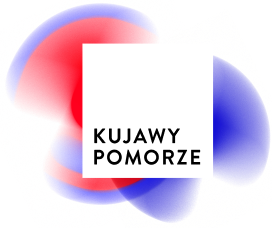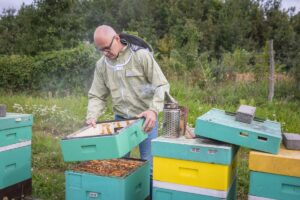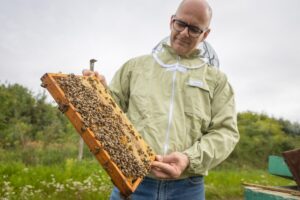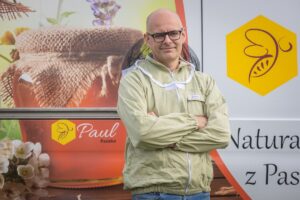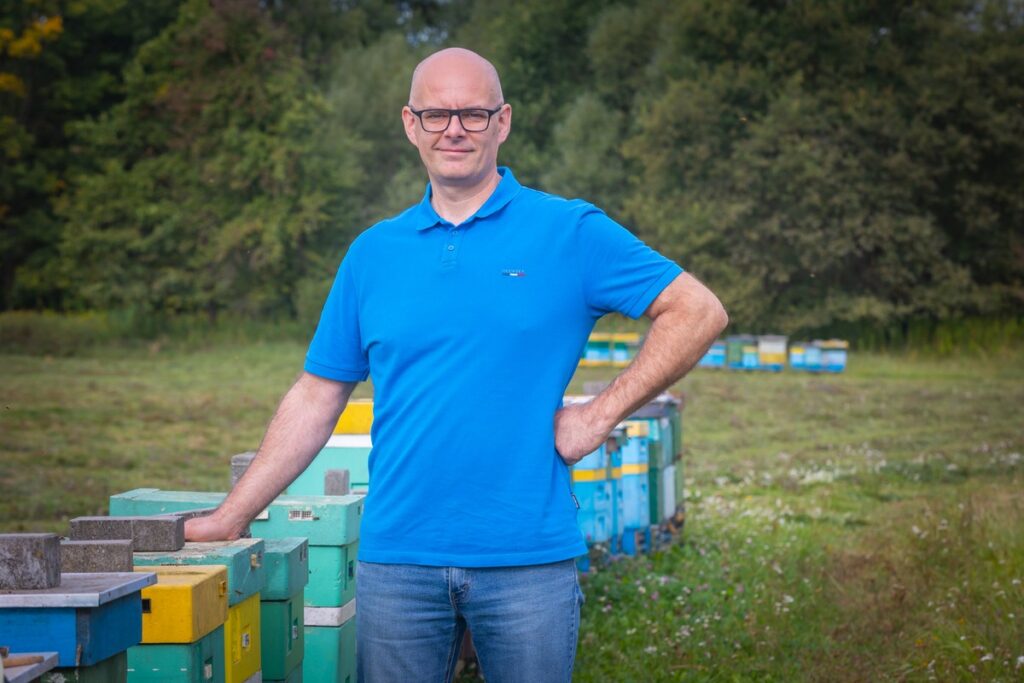
Honey – best straight from the apiary!
Interview with Tomasz Paul, beekeeper
Why is it beneficial to consume honey? How should one select it? What should one pay attention to?
Eating honey has many health benefits. Honey is a natural alternative to sugar and has a lower glycaemic index, which means it causes less of a spike in blood sugar levels. It also has antibacterial and antiseptic properties, making it effective in treating minor wounds and burns, as well as sore throats and coughs. Honey is also a rich source of antioxidants, which slow down the ageing of our body’s cells, support the digestive system and are an excellent source of energy.
How to choose honey? That’s a good question. Choosing good honey is not an easy task. There are many low-quality honeys on the market, or those that have nothing to do with honey.
Pay attention to the consistency – real mature honey should crystallise, i.e. change from a liquid to a thick form. The exceptions are acacia and honeydew honeys, which remain liquid for a long time. Check the label – it should contain all the manufacturer’s details, the type of honey and the country of origin.
And it is best to buy directly from a beekeeper – this guarantees authenticity. Every beekeeper cares about their reputation and will not risk selling a bad product.
You have been running a family apiary in Gniewkowo for many years, and recently also an apiary on the roof of the Marshal’s Office. How different are these apiaries?
We have been running the apiary for over 70 years. I am the third generation of beekeepers in our family. Our apiary consists of over 300 hives. It is a migratory apiary, which means that it moves to different regions of the province, and sometimes even the country, depending on the availability of nectar sources.
I have been running the apiary on the roof of the Marshal’s Office for several years. It is a smaller apiary consisting of five hives. The work in a rural and urban apiary is no different. The only difference is in the frequency of honey harvesting. In a migratory apiary, I obtain honey from eight, sometimes nine sources, including rapeseed, acacia, phacelia, linden, sunflower, buckwheat, honeydew and heather. In the apiary on the roof of the Marshal’s Office, I have one honey harvest and obtain multi-flower honey. There are many lime and acacia trees in the centre of Toruń, and the parks are full of blooming flowers, which means that the honey harvested in the city has a great taste and very good health properties.
Beekeeping is not only about producing a healthy sweet delicacy, but also about caring for the bee population, which plays a key role in ecosystems as pollinators. In the Kuyavian-Pomeranian region, we have a substantial budget, supported by EU funds, dedicated to protecting pollinating insects.
In recent years, we have not observed a decline in the number of bees, and there has even been a slight increase in the number of apiaries. Thanks to EU funding, beekeepers receive subsidies for purchasing new bee colonies. This has led to a rise in the number of young beekeepers who run small apiaries, supplying honey to their families and friends. We also have subsidies for the purchase of medicines, without which bees would not survive. The regional government also allocates funds for the purchase of bee feed paste, which we can use during winter feeding.
12 September 2025

